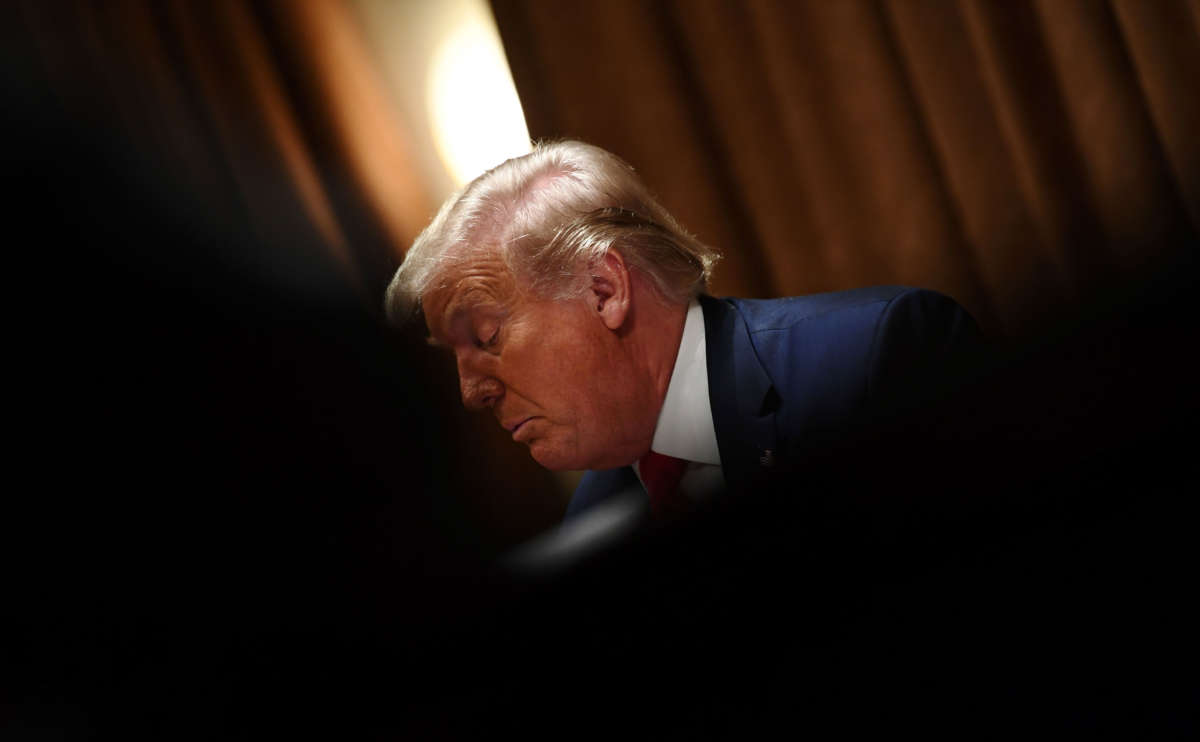Truthout is a vital news source and a living history of political struggle. If you think our work is valuable, support us with a donation of any size.
Documents filed on Monday in a high-profile legal case centered on President Donald Trump’s taxes revealed that the investigation is likely searching for evidence of banking or insurance fraud performed by the former business mogul.
Manhattan District Attorney Cyrus Vance Jr. is seeking eight years of the president’s tax filings in order to discern whether funds were illegally used or obtained by Trump in the past. While the prosecutor’s office doesn’t state outright the specific allegations made against the president, they do make mention in a court filing made on Monday of “undisputed” news reporting in 2019 regarding Trump’s former business practices as a legal basis to subpoena his tax records.
Prior to today’s filings, it was believed Vance was looking specifically into hush-money payments, allegedly made from Trump to adult entertainers in exchange for their silence about his extramarital liaisons with them. But based on the assertions made in today’s court filing, it appears that the investigation is looking into other matters as well, including possibly whether Trump in the past has ever inflated claims of his net worth in order to secure huge loans from banks — something his former lawyer Michael Cohen asserted he had done during congressional testimony in February of last year.
Vance’s filing states it’s a “false premise” that his inquiry is focused on the hush-money payments issue alone. The document said that news reports of other questionable financial practices were also of concern, making it likely that Cohen’s allegations will also be examined.
The records that Vance’s office filed today seek to explain, in response to more challenges by Trump’s legal team, why the district attorney’s office should be allowed access to Trump’s financial information.
“These reports describe transactions involving individual and corporate actors based in New York County, but whose conduct at times extended beyond New York’s borders,” Vance wrote in the filing seeking Trump’s taxes, further describing the president’s actions as “possible criminal activity.”
Last month, the United States Supreme Court ruled in favor of Vance’s office, finding that the president could not keep his tax records hidden during an inquiry into his previous financial actions. The Court asserted in a 7-2 ruling that “no citizen, not even the President, is categorically above the common duty to produce evidence when called upon in a criminal proceeding.”
While The High Court did find that the chief executive held no such privilege, it did not rule that the president could not use other legal means to attempt to keep the records sealed away, unrelated to his office. Because of that possibility, the case was sent to lower courts where those challenges will likely be hashed out for the next several months, making it incredibly unlikely that Trump’s taxes would be viewable by the public before the presidential election, if they ever get publicly released at all.
During the 2016 presidential race, Trump had promised he would release his taxes for examination, as most modern presidential candidates have since the 1970s, upon completion of an audit. Yet he never fulfilled that promise, and later reneged on it completely, eventually claiming the American people had lost interest in them near the time of his inauguration.
Polling around the time he made that claim indicated he was wrong, that the vast majority of voters were still interested in knowing about his finances. Indeed, polling to this day demonstrates that the American people are still eager to know more about Trump’s finances, as evidenced by the response from more than two-thirds of the participants in a recent Reuters-Ipsos poll from last month.
A terrifying moment. We appeal for your support.
In the last weeks, we have witnessed an authoritarian assault on communities in Minnesota and across the nation.
The need for truthful, grassroots reporting is urgent at this cataclysmic historical moment. Yet, Trump-aligned billionaires and other allies have taken over many legacy media outlets — the culmination of a decades-long campaign to place control of the narrative into the hands of the political right.
We refuse to let Trump’s blatant propaganda machine go unchecked. Untethered to corporate ownership or advertisers, Truthout remains fearless in our reporting and our determination to use journalism as a tool for justice.
But we need your help just to fund our basic expenses. Over 80 percent of Truthout’s funding comes from small individual donations from our community of readers, and over a third of our total budget is supported by recurring monthly donors.
Truthout’s fundraiser ended last night, and we fell just short of our goal. But your support still matters immensely. Whether you can make a small monthly donation or a larger one-time gift, Truthout only works with your help.
